Kids won’t listen? Feeling ignored? This guide will help you understand why your kids aren’t listening and what you can do to encourage them to listen well.
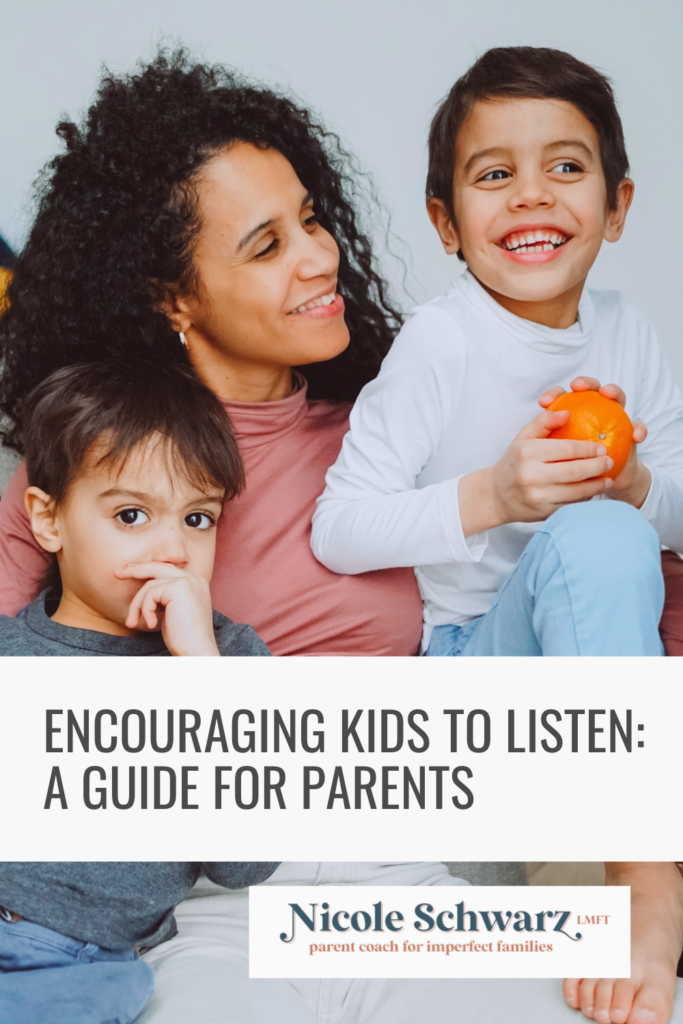
In my parent coaching sessions, getting kids to listen is the #1 concern.
Parents share these complaints:
My kids ignore me.
My kids won’t do what I ask unless I threaten to take something away or give them a bribe.
My kids listen to their dad, but not me.
My kids only listen if I yell.
I have to repeat myself a hundred times a day!
Can you relate?
If we’re being honest, “encouraging” our kids to listen isn’t what we really want. We want kids who do what we say, immediately after we say it, with a happy attitude.
Is that too much to ask?
Listening Well: It Starts With You
With any parenting challenge, I believe it’s important to start with you (as in the title of my book: It Starts With You).
Take a deep breath and pause.
Make a little space in your day to think about listening – both your own kids listening to you and the experience you had as a child listening to your parents.
Notice what comes up without judgment. It’s OK to feel whatever you feel. Right now, you’re just being curious. Learning all you can about what’s wrapped up in getting your kids to listen!
- What are your expectations around your kids listening?
- What thoughts go through your head when your child does not listen?
- How do you feel when you have to repeat yourself or when your child says “no”?
- What was expected of you as a child with regard to listening?
- How did your caregivers respond/react when you did not listen?
Next, take another deep breath. And another pause. Think about a difficult listening situation that happened recently or a scenario that comes up often.
Think about this situation as if you were an outsider, someone looking in. What would they see? What would they hear? What words do you say? What words do your kids say?
Slow the situation down. What happens first? What happens next? Then what happens? How does the situation end?
Again, work to be non-judgmental here. You’re not here to judge yourself or your parenting. You’re here to learn as much as you can about what happens in these tense, no-one-is-listening-to-me situations.
Take your time. Make space for this curiosity. It’s important.
The interactions we have with the people in our homes are often more like dances. We each have a role to play, and we each know the dance.
Even if we don’t love the dance.
Even if we think the dance wouldn’t happen if the other person would just learn their part!
Recognizing the part you and your child play in the dance will give you a chance to change the dance moves!
(Cue the music!)
How Does Your Child Listen and Learn?
Now that you have a little idea of the communication pattern, we need to get curious about your unique child.
Each child is different, so each child in your home is going to be different.
While this makes parenting a bit more challenging, it also gives you an amazing opportunity to interact with your kids in a way that truly works for them.
Rather than talking and *hoping* your kids hear you. Let’s be curious about the best way to present information to your kids.
Think about these questions:
- How old is your child? (You can think about this as their age or as their developmental age/stage.) Some kids are going to need more hand-holding and more reminders before they are able to listen well.
- How does your child learn? Some kids are hands-on learners, they need the experience of “doing” before it makes sense. Some kids are visual. Some kids would rather hear something explained.
- How does your child process information? Some children can hold a long list of tasks in their brain and mentally check them off when they are completed. Some kids need to take tasks one at a time, and sometimes, they need this one task broken down into smaller mini-tasks.
- Does your child get distracted easily? Some kids are focused on the task. Some can’t make it into the other room without forgetting why they were headed in that direction. Are there things that distract your child more than others?
- What are your child’s triggers? Which situations, phrases, environments, or interactions seem most difficult for your child when it comes to listening? How does your child show that they are stressed/overwhelmed/frustrated?
- What has worked well in the past? Thinking about successes doesn’t mean they work 100% of the time, but it may be helpful to keep in mind for the future.
- How does your child feel most loved? (Feeling connected to a caregiver increases the chances of listening!) Is your child more of a cuddler? Do they like to be active? Do they like to play? Do they thrive on positive feedback?
What else makes your child unique? What else makes it difficult for your child to listen and follow through with requests?
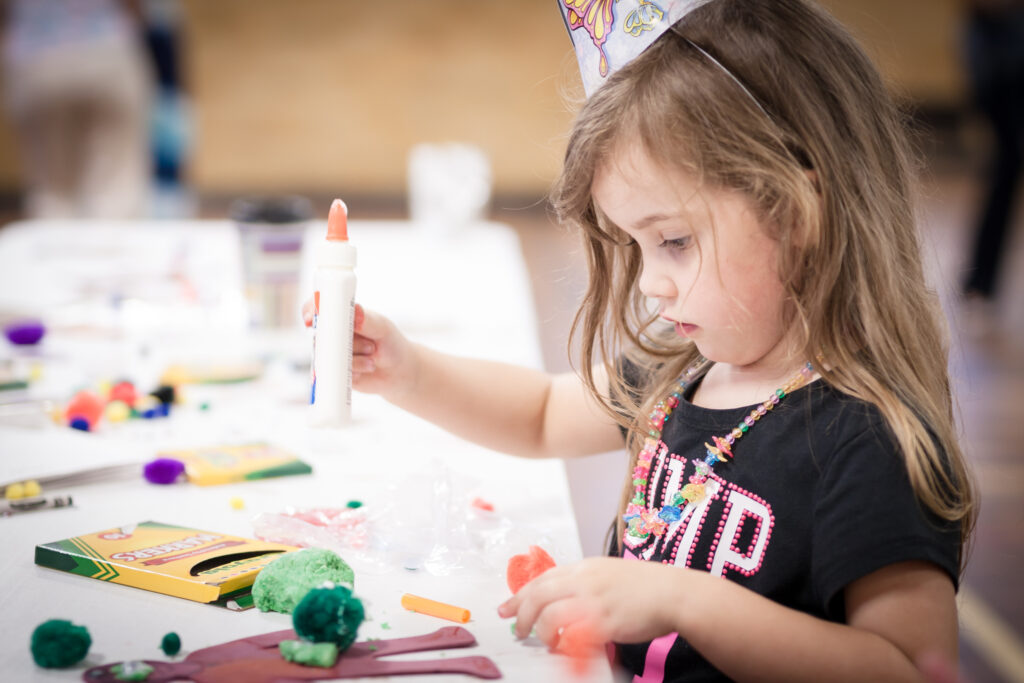
Getting Kids to Listen: Becoming Aware of the Words we Use
OK. You’re aware of the dance. You know more about how your child learns, processes, and where they have challenges listening.
Now, let’s talk about common pitfalls when trying to encourage our kids to listen, and what to try instead.
Too many words. If you find yourself repeating, giving a lecture, using logic, reasoning, or rationalizing a decision or a request, most likely your child tuned you out within the first few seconds. Instead, make your request shorter and/or use fewer words. Example: “Get your shoes on, we’re going to be late, where is your backpack? Why aren’t you getting your shoes on? Come on! Let’s go!” vs. “Shoes.”
Not enough words. Sometimes, we leave too much unsaid. We do not explain ourselves clearly or we leave things open to interpretation. Use the number of words that work best for your child. Example: “The dishwasher needs to be emptied.” vs. “Please empty the entire dishwasher before 10 am.” vs. “Let’s empty the dishwasher together. Can you hand me the plates?”
Passive aggressive language. Guilt. Shame. All of these seem to be ways of motivating kids to listen, but instead, they build a bigger divide between us. (And often leads to one or both of us feeling horrible!) Instead, be direct, empathetic, and use “I statements.” Example: “Here I am, waiting by the door again, you only care about errands that are fun for you.” vs. “I know you don’t want to go to the grocery store. I feel the same way. And yet, we need to do it. I’m so happy to have your help.”
Starting with what they did wrong. It’s easy to overlook our child’s progress because they leave tasks unfinished or do things imperfectly For some children, criticism or pointing out their mistakes, leads them to put in less effort next time. Challenge yourself to focus on the good first, saving corrections for later. Example: “Look at this room! I thought you were going to clean it today!” vs. “You’re making progress. I see all of the books are on the bookshelf.”
Our timeline is different. Kids live in the moment. They are not great at planning ahead or thinking about what’s happening next. Many kids need extra time to transition from one activity to the next. As parents, we are often the timekeepers. We see the clock running out while our child is still in their pj’s. Instead, do what you can to help your child manage their time. Example, “Time to leave the park!” vs. “Two more times down the slide, then we’re getting in the car!”
Our expectations are different. This may be with regards to an outing, an activity, a gift, or the order we think something should be completed. Be aware of the expectations you both bring to the table. Sometimes our expectations are mismatched. Do what you can to clarify your expectations ahead of time, recognizing that your child still may not agree! Example, “I just bought a cart full of groceries! I’m not buying candy in the checkout line.” vs. “We are here to buy groceries, we will not be buying candy when we get to the checkout counter today.”
Breathe.
Whatever you’re feeling is OK.
Communicating with our kids in a way that fosters listening is not easy! It takes time, practice, and patience.
You may be breaking generational patterns, which means you don’t have a great model to follow.
Be kind to yourself as you learn something new!
Encourage Your Child to Listen: Relay your Message Clearly
In addition to speaking clearly, here are a few other things you can do to encourage your kids to listen.
Go where your kids are. As tempting as it is to yell a request from the kitchen, there’s a better chance your kids will hear you if you go into the room with them.
Get their attention. If your kids are watching YouTube, working on Legos, or playing in the sandbox, they may struggle to shift their attention to what you’re saying. Instead, give them a few seconds to realize you’re present before you start talking.
Watch your nonverbals. Hands on your hips. Pointing your finger. Sighs of frustration. Eye rolls. These are all ways you (unintentionally) discourage listening. Instead, take a deep breath. Get on their eye level if they are small. Extend your hands. Smile. Offer a hug. Give your kids the nonverbal encouragement they need to hear what you’re asking.
Be patient. Kids need to practice skills many, many times before they become a habit. And, even once these habits have taken hold, it may still be difficult for them to follow through if they are tired, hungry, stressed, or feeling disconnected from you. If your child seems to have “forgotten” how to listen, pause. Think about what might be missing in this situation. Would a quick snack help them get back on track?
Reminders are normal. Kids need lots of reminders. They will need reminders for years to come. They will need fewer reminders as they grow, but for now, I would expect to do quite a bit of repeating. Instead of saying the same thing over and over, think, “What can I say/do to help them stay on task?” It may be a visual reminder, it may be holding their hand to the bathroom, it may be asking them, “What else do you need to do before we leave for school?”
And of course, if you find something that works, do more of whatever helps your unique child listen well!
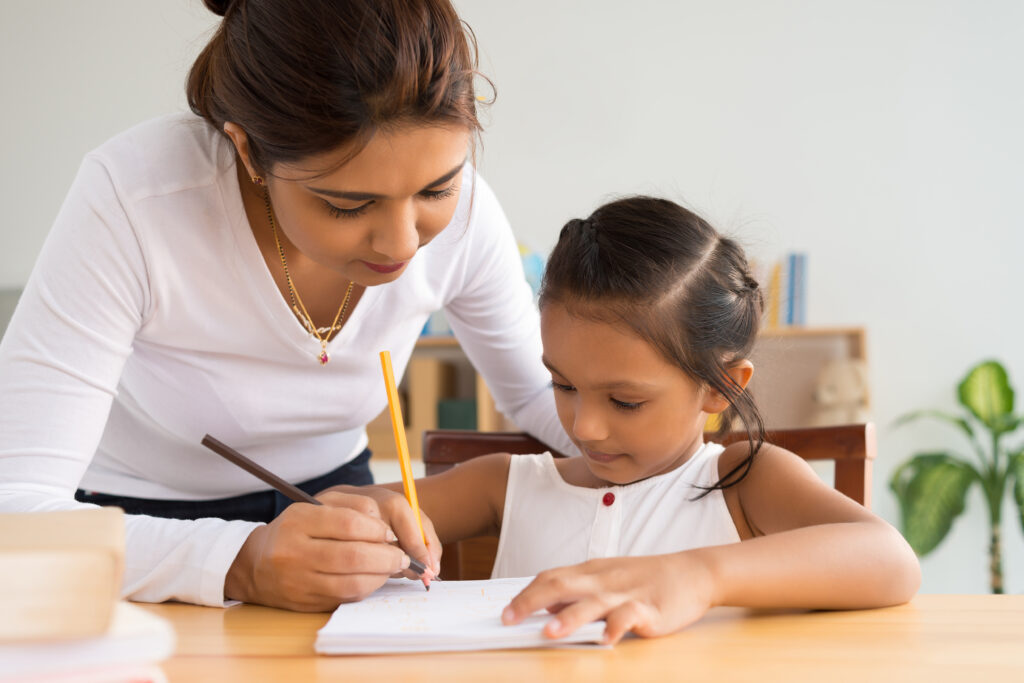
Yeah, but…
My kids still don’t listen.
Sometimes you can do everything in this guide and your children still struggle with listening.
How you define your child’s resistance is important. If you see them as lazy, willfully disobedient, or defiant. You’re going to be more defensive. You’re going to go into conversations ready for a fight.
If you get curious about your child’s resistance, you’re more likely to find compassion and empathy for their perspective. Not that you have to agree with their perspective, of course, just that you can imagine how it feels to be in their shoes.
Go back to the dance.
Where are things getting off track?
Ask yourself, “is there a way I can encourage them to listen better?” or “Is there a way I can communicate this better/more clearly?”
For some kids, following directions well is difficult. Not because they don’t want to listen, but because they can’t always discern which of the many inputs is the most important. For some kids, anxiety gets in the way. These kids often appear defiant, when really, they are listening to the little voice of anxiety inside sending them a different message, “No! Bedtime is scary! Don’t let mom leave the room!”
You may find that you need more support. Sometimes, we cannot be our child’s parent and their therapist, Occupational Therapist, or teacher. If your child is struggling, or if you are unsure where to go from here, reach out for additional support. Find a mental health provider or talk to your child’s school for resources.
Listening is a skill. Your child needs lots of opportunities to strengthen this muscle.
If they are struggling, it doesn’t mean they are a bad kid.
And it doesn’t mean you are a bad parent.
It means you are a normal imperfect family.
See your child as someone who needs support. Someone in their corner. Someone to model listening well.
They need you!

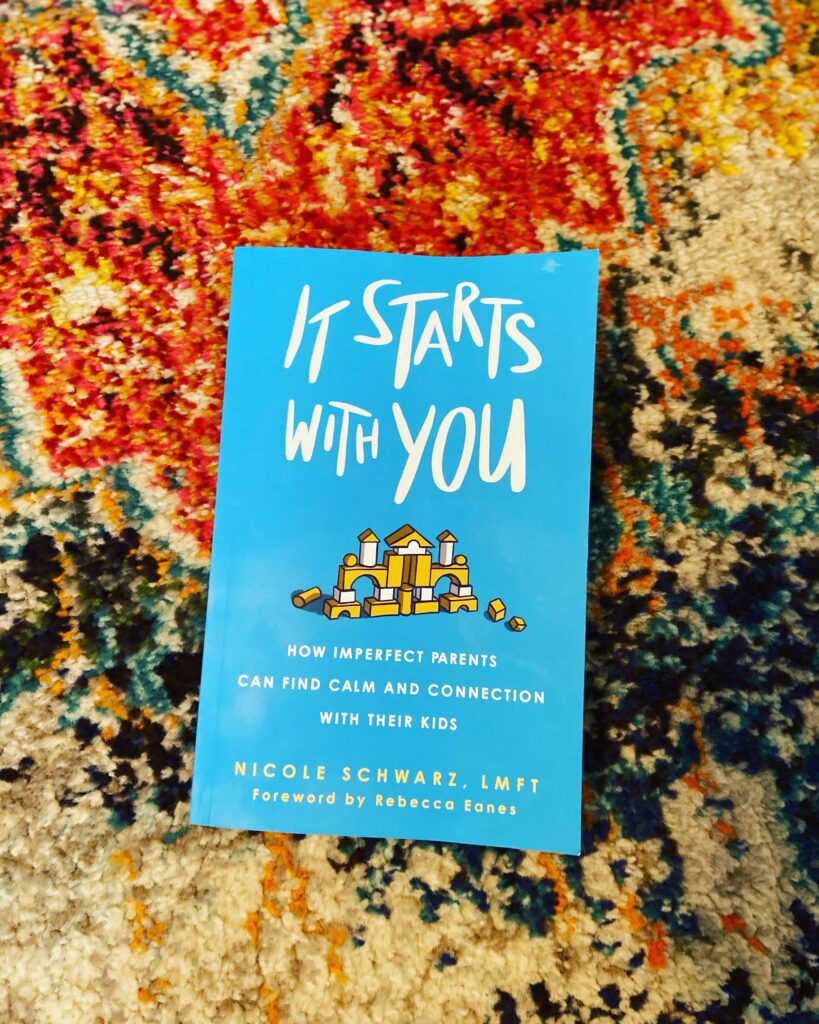

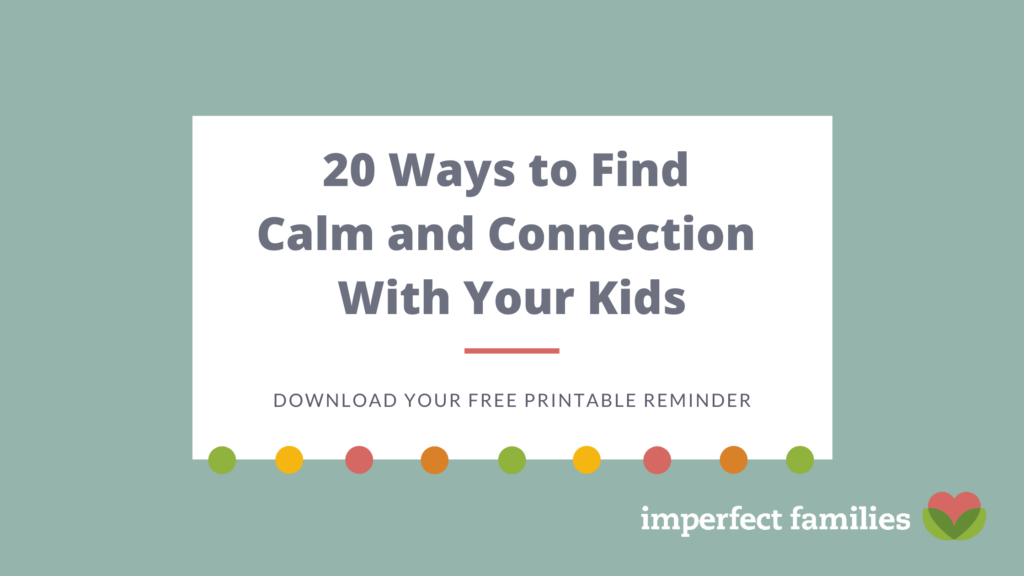
Comments have been turned off to retain the privacy of all families. If you have a question or comment on the topic, you're always welcome to contact me.